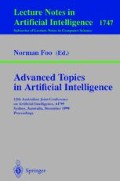Abstract
This paper analyzes the notion of a minimal belief change that incorporates new information. I apply the fundamental decision-theoretic principle of Pareto-optimality to derive a notion of minimal belief change, for two different representations of belief: First, for beliefs represented by a theory—a deductively closed set of sentences or propositions—and second for beliefs represented by an axiomatic base for a theory. Three postulates exactly characterize Pareto-minimal revisions of theories, yielding a weaker set of constraints than the standard AGM postulates. The Levi identity characterizes Pareto-minimal revisions of belief bases: a change of belief base is Pareto-minimal if and only if the change satisfies the Levi identity (for “maxichoice” contraction operators). Thus for belief bases, Pareto-minimality imposes constraints that the AGM postulates do not.
Access this chapter
Tax calculation will be finalised at checkout
Purchases are for personal use only
Preview
Unable to display preview. Download preview PDF.
References
Alchourrón, C.E. and Makinson, D.: 1982, ‘The logic of theory change: Contraction functions and their associated revision functions’, Theoria 48:14–37.
Chou, T. and Winslett, M.: 1994, ‘A Model-Based Belief Revision System’, in Journal of Automated Reasoning 12:157–208.
Gärdenfors, P.: 1988, Knowledge In Flux: modeling the dynamics of epistemic states. MIT Press, Cambridge, Mass.
Hansson, S.O.: 1998, ‘Editorial: Belief Revision Theory Today’, Journal of Logic, Language and Information, Vol.7(2):123–126.
Katsuno, H. and Mendelzon, A.O. 1990: On the difference between updating a knowledge base and revising it, Technical Report on Knowledge Representation and Reasoning, KRR-TR-90-6, University of Toronto, Department of Computer Science.
Katsuno, H. and Mendelzon, A.O. 1991: ‘On the difference between updating a knowledge base and revising it’, in Proceedings of the Second International Conference on Principles of Knowledge Representation and Reasoning, Cambridge, Mass., pp.387–394, Morgan Kaufmann.
Levi, I.: 1996, For the sake of the argument: Ramsey test conditionals, Inductive Inference, and Nonmonotonic Reasoning, Cambridge University Press, Cambridge.
Nayak, A.: 1994, ‘Iterated Belief Change Based on Epistemic Entrenchment’, Erkenntnis 41: 353–390.
Nebel, B.: 1989, ‘A Knowledge Level Analysis of Belief Revision’, in: R. J. Brachman, H. J. Levesque, and R. Reiter (eds.), Proceedings of the First International Conference on Principles of Knowledge Representation and Reasoning (KR’89), Toronto, Canada, pp. 301–311, Morgan Kaufmann.
Nebel, B.: 1994 ‘Base Revision Operations and Schemes: Representation, Semantics and Complexity’, in: Proceedings of the 11th European Conference on Artificial Intelligence (ECAI’94), Amsterdam, Netherlands, pp. 341–345, Springer Verlag.
Author information
Authors and Affiliations
Editor information
Editors and Affiliations
Rights and permissions
Copyright information
© 1999 Springer-Verlag Berlin Heidelberg
About this paper
Cite this paper
Schulte, O. (1999). Minimal Belief Change and Pareto-Optimality. In: Foo, N. (eds) Advanced Topics in Artificial Intelligence. AI 1999. Lecture Notes in Computer Science(), vol 1747. Springer, Berlin, Heidelberg. https://doi.org/10.1007/3-540-46695-9_13
Download citation
DOI: https://doi.org/10.1007/3-540-46695-9_13
Publisher Name: Springer, Berlin, Heidelberg
Print ISBN: 978-3-540-66822-0
Online ISBN: 978-3-540-46695-6
eBook Packages: Springer Book Archive

